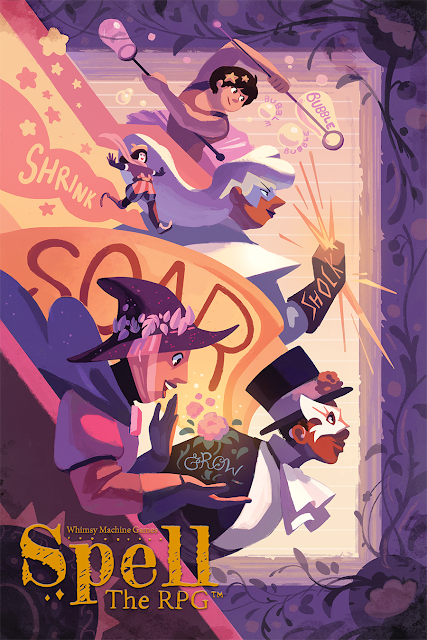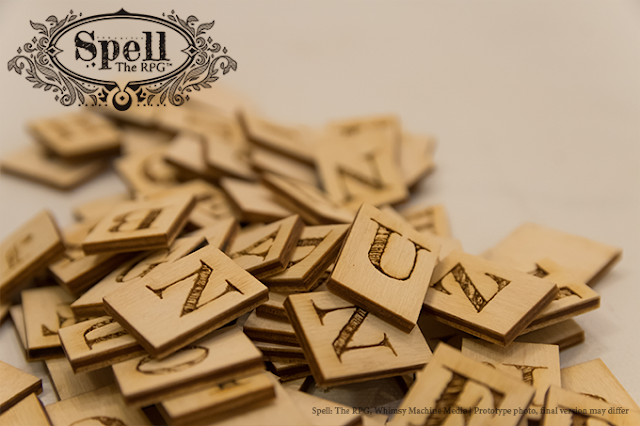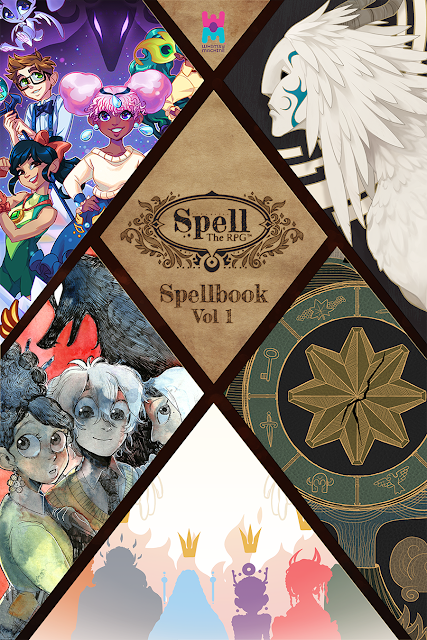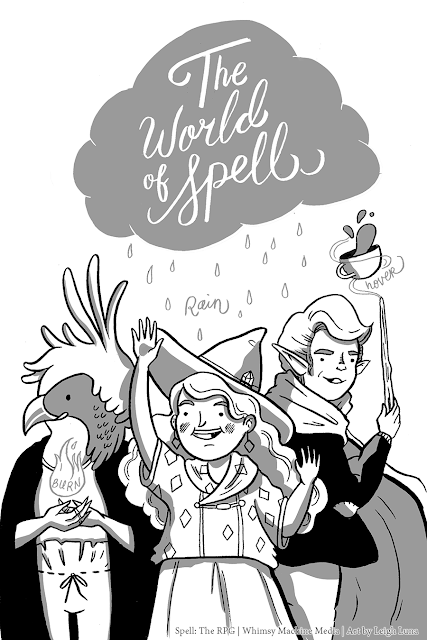I have an interview today with Taylor Smith on Spell: The RPG which is going up for purchase after a successful Kickstarter! Check out what Taylor has to say about this clever magic RPG!
--
 |
| I love the colorful cover by Nathalie Fourdraine! |
Tell me a little about Spell: The RPG. What excites you about it?
What's really been exciting about Spell: The RPG for me is its potential, both for players and myself. I'm so happy to say that Spell has been quite a few people's first ever tabletop game and has changed a few minds about the hobby. I'm also regularly very pleasantly surprised by things I've seen players do with the system, either in their interpretation of the rules or when they hack and mod it for their own play groups. And then there's the potential of what it represents for me, as a product: I'm publishing Spellbook Vol. 1 alongside Spell: The RPG, which contains five campaigns written by me and illustrated by five fantastic artists; Spellbook Vol. 2 will have another set of campaigns, but written by other creators. I'm so excited to see creators I personally admire telling stories with Spell that I never could've told.
What was the inspiration for the clever main mechanic, and how does it work when someone decides to cast a spell?
About five years ago, I was co-running a larp and only tinkering with game mechanics at the time. After a rousing game of Scrabble, I got it stuck in my head to make an RPG using Scrabble tiles. The idea percolated, incomplete, until I was working on a piece of someone else's game—a system meant to represent basic human motivations. That mechanic, which would evolve into the Impulses, wasn't used for that other game, so I recycled it as a core game engine; I remembered the letter tiles and then plugged these two orphaned mechanics together.
The way these pieces work are complementary: basic tasks are accomplished with the twelve Impulses, which are motivation-oriented stats; players roll a number of six-sided dice equal to the Impulse they'd like to act on to accomplish a goal (to get through a locked door, maybe use Daring to burst in spells blazing, Force to break the door down, Reason to think through how the door might be dismantled, Style to make the best entrance, or Calm to just knock) and the results are compared against a difficulty.
To cast a spell, the player states their goal, rolls an Impulse, sums the results, and then draws that many random letter tiles. As the player tries to spell a word with the tiles, the character is sifting through glyphs of the universal language to rearrange reality. If a word is spelled (and adequately justified) the spell is successfully cast. If the spell is in conflict with someone else, like a baddie, they get a chance to defend, so there's a fairness of rolled stats vs rolled stats with modifiers for how fitting the spell is for the situation. Players can spend Potential points in the moment to save spells they like and then reuse them later without having to spell them over again. There's no "mana" or "slots," so characters always have access to new, strange magic, as well as their own repertoire of custom spells they build over time.
The way these pieces work are complementary: basic tasks are accomplished with the twelve Impulses, which are motivation-oriented stats; players roll a number of six-sided dice equal to the Impulse they'd like to act on to accomplish a goal (to get through a locked door, maybe use Daring to burst in spells blazing, Force to break the door down, Reason to think through how the door might be dismantled, Style to make the best entrance, or Calm to just knock) and the results are compared against a difficulty.
To cast a spell, the player states their goal, rolls an Impulse, sums the results, and then draws that many random letter tiles. As the player tries to spell a word with the tiles, the character is sifting through glyphs of the universal language to rearrange reality. If a word is spelled (and adequately justified) the spell is successfully cast. If the spell is in conflict with someone else, like a baddie, they get a chance to defend, so there's a fairness of rolled stats vs rolled stats with modifiers for how fitting the spell is for the situation. Players can spend Potential points in the moment to save spells they like and then reuse them later without having to spell them over again. There's no "mana" or "slots," so characters always have access to new, strange magic, as well as their own repertoire of custom spells they build over time.
 |
| A collection of the tiles used for "casting" in Spell! |
What are the campaigns like - adventures, mysteries, etc.? How did you create unique and interesting campaigns?
Spell: The RPG is functionally "setting neutral," meaning it can be played in any world in any era, so I've also included Spellbook Vol. 1, which is a collection of five campaign supplements. I tried to represent a variety of options for how play could look and invited players to hack and modify the game as they'd like for their own games. For example, Magic Moon Warrior is a monster-fighting magic girl adventure to the moon and includes some modified rules for transformation spells; Wakeful in Reverie has rules for only being able to use spells while lucid dreaming, as the story straddles the line of waking and sleep; Godqueen, which can be played as a GM-all/any campaign, has the players in the role of a pantheon guiding a civilization throughout history. Spell can support a serious ongoing campaign with longterm character growth and story progression or provide the minimum necessary structure for an absolutely wacky one-shot.I believe in players' ability to invent and create, so instead of providing a definitive lore, I wanted to make tools players could build their own world and stories with. Spell is written with goals of creativity and potential in mind, so even during the most daunting campaigns, there is agency in the ability for players to create their own magic. There's also always an element of physical play involved—the actual rearranging of letters—which I think helps players feel collaborative and imaginative. The name of the game is literally a pun, so humor is absolutely welcome. Maybe a player wants a powerful spell to extinguish a raging inferno and while looking at their letters, they realize they can spell "cats." The group can share a laugh, maybe a welcome reprieve from the intense situation, as they imagine a horde of kitty firefighters; they could even discuss this option in character! Maybe they go with that one or they spell something else, diving back into the action, but that moment of silliness and play still happens.
 |
| The characters on this cover already gained my interest! |
Tell me about Impulses. What do they mean to the characters, and how are they set up - default values, gained over time, etc.?
Impulses are goal-oriented stats that both provide the math for rolls to be made, as well as help shape the character's personality and methodology. The twelve Impulses are: Calm, Daring, Feeling, Focus, Force, Grit, Hope, Reason, Renown, Scheme, Style, and Trust. The player assigns twelve points between them at character creation; some will likely start at zero, but that doesn't mean the character doesn't experience that Impulse, they just can't rely on it to inspire action. For example, a character with zero Calm is still capable of being calm, they just can't pull on that part of themselves enough to effectively diffuse a chaotic situation, but maybe they use Grit to weather it. Characters gain Potential points, which are like experience, but you get them at the start of a session and you can spend them in the moment; these points are used to both keep spells and to increase Impulses.Impulses are important to me, especially in trying to make them intuitive. While a player is assigning points to their character sheet, they have to think both about what the character can do, but also what the character is like, how they view the world, and how they meet their challenges. By using more common words, the idea is that a player could say something like, "My character just really hopes this is going to work out," so that means they're using Hope. Impulses also represent fields of knowledge from their past experiences related to that Impulse. For another example, if a character is Daring and skydiving is their main outlet for it, they'll have the skills and experience associated with skydiving; if their thrill is on the stage, they'd have skills and experience related to their performances. The goal is, after filling in Impulses, the player has a holistic character with a lot of potential for inferred experiences and abilities.
 |
| These characters in this illustration by Christina Gardner look so fun! |
How do you think the narrative control players have in the game will support a healthy play environment? What sort of supportive tools for the narrative are you including or recommending to go along with Spell: The RPG, since it's such a freely flowing game?
I describe Spell: The RPG, in the book, as "light-hearted" and encourage players to use a setting that's supportive and thinks magic is neat, though there are notes about more grimdark interpretations—with disclaimers about consent for those themes ahead of time. With that setting as a backdrop, it's been my experience that the collaborative, creative, and just a bit silly process of rearranging letters, especially physical tiles, really helps the game feel like "play." The party works together, but so too do the players in a very tactile way; it creates an environment of everyone wanting everyone else to succeed, not just be the best or coolest individual.In addition to regular comments throughout the rules and settings, like "this can be heavy, so make sure to talk about it first," the Game Moderator section (I'm using "moderator" instead of "master" because I believe a GM is a facilitator and a player, not a tyrant in a gross power dynamic) includes steps for conflict resolution, a summary of the lines and veils system, and a summary of your own Script Change system. These tools are super important to me and I've been using them in my own games. While Spell: The RPG is outwardly positive, it's perfectly capable of including many, very different themes and content. Even simply the opportunity to spell swear words or slurs from random letters can disrupt the game for players, so guidance on these elements is also included. The rules also make specific mention that characters, as adventurers, are not at all limited in their gender, ethnicity, or background. Additionally, there's a note on disabilities:
There are no mechanical “flaws” designed for Spell: The RPG. Impulses represent a character’s motivation, so no disability will make them less capable of adventure. The respectful inclusion of physical and mental disabilities as roleplaying cues or context for actions is certainly encouraged, but there are no one-size-fits-all modifiers to apply.This intention is also reflected in the cover art (by Nathalie Fourdraine), which prominently features a variety of body types, gender and cultural representation, and the inclusion of a character with a hearing aid and a character with an athletic prosthetic leg. For the all the interior art of Spellbook Vol. 1, finding Own Voices illustrators was key and an open discussion of diversity in the characters was vital. My hope is to have Spell create a comfortable and inclusive foundation that players can play within—whatever those games may be—and feel like that foundation supports them, their identity, and their goals for play.
As a final note, I'd like to include that I love hearing from players, their experiences, and their feedback. I try to stay as open and accessible as possible myself. My contact info is included in the books, so both positive and negative comments will be heard.
 |
| I love the cute characters here by Leigh Luna! |
--
Thank you so much, Taylor, for the great interview! I hope you all enjoyed learning about Spell: the RPG and will check out the newly released materials when they come out! In the meantime, check out Taylor's new work on Drip!
This post was supported by the community on patreon.com/briecs. Tell your friends!
To leave some cash in the tip jar, go to http://paypal.me/thoughty.
If you'd like to be interviewed for Thoughty, or have a project featured, email contactbriecs@gmail.com.
Thank you so much, Taylor, for the great interview! I hope you all enjoyed learning about Spell: the RPG and will check out the newly released materials when they come out! In the meantime, check out Taylor's new work on Drip!
This post was supported by the community on patreon.com/briecs. Tell your friends!
To leave some cash in the tip jar, go to http://paypal.me/thoughty.
If you'd like to be interviewed for Thoughty, or have a project featured, email contactbriecs@gmail.com.

No comments:
Post a Comment